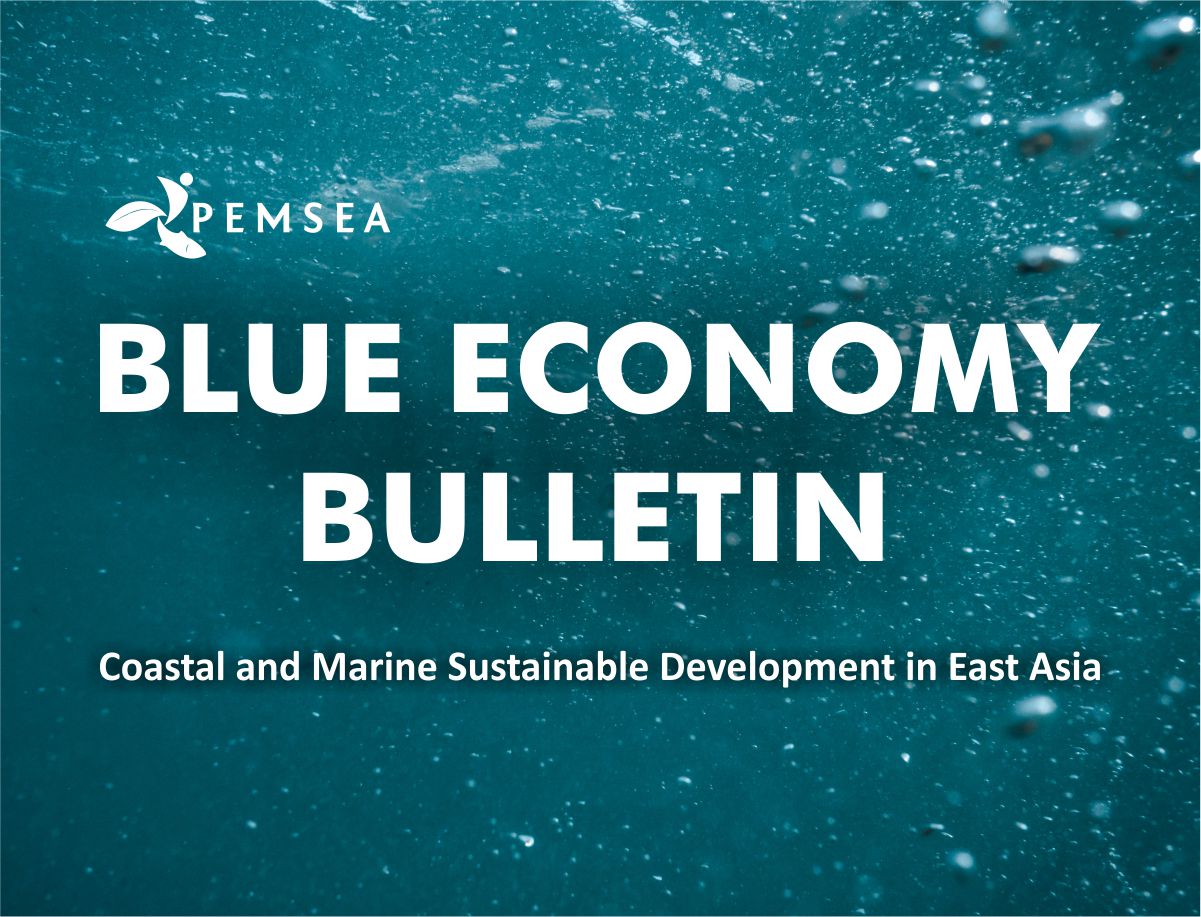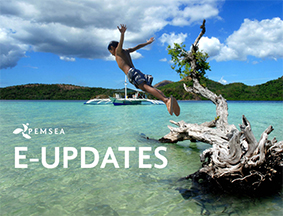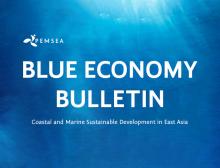
Breadcrumb
-
Blue Economy Bulletin October 2020
Welcome to the PEMSEA October PEMSEA Blue Economy Bulletin. As we near the end of 2020, our SDS-SEA projects are coming to a close. This month, we share news of our work in Cambodia. Looking forward to new projects, PEMSEA announced our participation in the GloFouling Partnerships, which aims to tackle an important but often overlooked issue, especially in maritime shipping. We also share the progress of our Country Partners towards the IMO conventions, which cover other aspects of ensuring maritime shipping is more sustainable.
Despite the COVID-19 pandemic, 2020 appears to have been a successful year for the shipping industry. International cooperation in this industry is important to tackle issues such as the use of potentially toxic antifouling materials. The other large shipping industry, fishing, is also in need of increased sustainability. The MSC is offering grants towards sustainability initiatives, and some countries in Southeast Asia are working together to manage transboundary mackeral populations.
Recovery from the COVID-19 pandemic could benefit by being linked to investment into climate-adaptive infrastructure. Such infrastructure will be of particular importance in coastal areas. Other coastal improvements include the planting of trees, and the sustainable management of coastal resources.
If you are from an affected country near the Arafura and Timor seas, we welcome you to join the online ATSEA-2 Stakeholder Partnership Forum this 2-5 November. Follow the latest updates on blue economy and coastal sustainable development in East Asia on Facebook and Twitter (@PEMSEA). We welcome your feedback, and please let us know if there are other blue economy topics you would like to see in future newsletters and programs.
-
E-Update September 2020
Welcome to the September 2020 PEMSEA e-update. Our main story this month is on our current work in Cavite that aligns with ongoing government efforts to clean and restore Manila Bay. These focus on plastic pollution, which in addition to being an eyesore has significant health and economic impacts. The external news stories collected cover a variety of coastal and marine topics, with a particular focus this month on climate change, a global crisis whose impact is already being felt and which will exceed the impact of the COVID-19 pandemic. In between newsletters, follow us on Facebook and Twitter (@PEMSEA) for the latest updates.
-
Blue Economy Bulletin August 2020
Welcome to the August 2020 Blue Economy Bulletin. This month the East Asian Seas Partnership Council confirmed that 37.9% of the region's coastline is now covered by an integrated coastal management (ICM) program. ICM provides a holistic framework for sustainable coastal development, and contributes greatly to the development of a blue economy. Encouraged by this milestone, PEMSEA continues to adapt its work through the pandemic period, and has expanded its partnerships to strengthen its work on climate change adaptation and disaster risk reduction, reduction of marine pollution, and capacity building of new coastal leaders in the region.
The pandemic has brought significant challenges to coastal communities. Interruptions to plastic supply chain operations have impacted the livelihoods of many actors, especially informal waste pickers. Contamination has been found on seafood, and demand for seafood exports has decreased. The overall impact of the crisis has moved Earth Overshoot day by three weeks. However, many local leaders are taking action to mitigate these issues in coastal cities.
Follow the latest updates on blue economy and coastal sustainable development in East Asia on Facebook and Twitter (@PEMSEA). We welcome your feedback, and please let us know if there are other blue economy topics you would like to see in future newsletters and programs.
-
E-Update July 2020
Happy Eid al-Adha and welcome to the July 2020 PEMSEA e-update! Following PEMSEA's first ever virtual Partnership Council meeting, we are pleased to announce two new partnerships and the extension of our Executive Director's term. It has been a busy month for coastal and ocean news, with topics including climate change, plastic pollution, and the impact of the COVID-19 pandemic on people, livelihoods, and coastal and marine ecosystems. In between newsletters, follow us on Facebook and Twitter (@PEMSEA) for the latest updates.
-
Blue Economy Bulletin June 2020
Welcome to the PEMSEA Blue Economy Bulletin for June 2020. The first half of 2020 saw the rise of COVID-19 throughout the world, including the East Asian region. This has slowed down the pace of the implementation of blue economy plans and programs, but at the same time has provided the space to recalibrate economies to better utilize blue economy approaches. PEMSEA has continued to work during this period, and a new Secretary General has been named for the PEMSEA Network of Local Governments (PNLG), who has pledged to help boost blue economy implementation in the region at the local level. We also share a paper on integrating blue economy principles into the governing framework of Timor-Leste, and progress in the ATSEA-2 project, which is working towards achieving a blue economy in the Arafura and Timor seas.
Outside of PEMSEA, new reports on global fisheries and aquaculture and on seagrass meadows highlight the crucial importance the sustainability component of the blue economy has for the environment and human health and livelihoods. One example of increasing sustainability is the blue swimming crab fisheries of Thailand. The seafood industry in Viet Nam has been encouraged to diversify its products.
A new toolbox released by BlueHealth serves to help asses the impacts of urban planning in an integrated framework. Integrated thinking is evident in Timor-Leste, where guidelines have been developed to ensure marine mammal eco-tourism is sustainable for wildlife and coastal communities. Meanwhile, the Philippines has developed an action plan for sustainable consumption and production and a shift to a more circular economy, and the GEF Council has approved $700 million for use in urgent environmental action during the COVID-19 pandemic.
Included near the end of this email are virtual events that one can participate in during the month of July, and recordings of past ocean webinars. Follow the latest updates on blue economy and coastal sustainable development in East Asia on Facebook and Twitter (@PEMSEA). We welcome your feedback, and please let us know if there are other blue economy topics you would like to see in future newsletters and programs.
-
E-Update May 2020
Welcome to the May 2020 PEMSEA e-update. PEMSEA continues to work to promote its vision of healthy ocean, people, and communities during this time. With the release of our Annual Report 2019, we share stories such as that of Timor-Leste's Green School Program and many others. We also share a paper on the Blue Economy developed by the Australian National Centre for Ocean Resources and Security (ANCORS), in collaboration with PEMSEA and the Government of Timor-Leste, and our message for World Oceans Day, on the use of integrated coastal management (ICM) as a core part of the pandemic and post-pandemic strategy to ensure the sustainable management and development of our coasts and oceans.
News from elsewhere is dominated by COVID-19 and climate change, two issues which both require large-scale action from across the world. COVID-19 is alleviating pressure on the environment, but is harming coastal livelihoods, and damaging progress in plastic recycling. Meanwhile, more research on climate change suggests it may cause ecosystems to collapse sooner, physiologically alter fish, and expose billions to dangerous heat.
In between newsletters, follow us on Facebook and Twitter (@PEMSEA) for the latest updates.
-
Blue Economy Bulletin April 2020
Welcome to the PEMSEA Blue Economy Bulletin for June 2020. The first half of 2020 saw the rise of COVID-19 throughout the world, including the East Asian region. This has slowed down the pace of the implementation of blue economy plans and programs, but at the same time has provided the space to recalibrate economies to better utilize blue economy approaches. PEMSEA has continued to work during this period, and a new Secretary General has been named for the PEMSEA Network of Local Governments (PNLG), who has pledged to help boost blue economy implementation in the region at the local level. We also share a paper on integrating blue economy principles into the governing framework of Timor-Leste, and progress in the ATSEA-2 project, which is working towards achieving a blue economy in the Arafura and Timor seas.
Outside of PEMSEA, new reports on global fisheries and aquaculture and on seagrass meadows highlight the crucial importance the sustainability component of the blue economy has for the environment and human health and livelihoods. One example of increasing sustainability is the blue swimming crab fisheries of Thailand. The seafood industry in Viet Nam has been encouraged to diversify its products.
A new toolbox released by BlueHealth serves to help asses the impacts of urban planning in an integrated framework. Integrated thinking is evident in Timor-Leste, where guidelines have been developed to ensure marine mammal eco-tourism is sustainable for wildlife and coastal communities. Meanwhile, the Philippines has developed an action plan for sustainable consumption and production and a shift to a more circular economy, and the GEF Council has approved $700 million for use in urgent environmental action during the COVID-19 pandemic.
Included near the end of this email are virtual events that one can participate in during the month of July, and recordings of past ocean webinars. Follow the latest updates on blue economy and coastal sustainable development in East Asia on Facebook and Twitter (@PEMSEA). We welcome your feedback, and please let us know if there are other blue economy topics you would like to see in future newsletters and programs.
-
E-Update March 2020
Welcome to the second PEMSEA e-update of 2020. PEMSEA, together with people, organizations, and governments around the world, has had its operations affected by Covid-19. We encourage all readers to practice best hygiene, safety, and physical distancing measures in dealing with this pandemic. In light of the potential impacts on large groups of people, we are not including upcoming events in this newsletter. We are glad to share the progress of some of our projects, which our staff are endeavoring to continue as best as possible in a manner that ensures their safety and the safety of the communities we work with. In between newsletters, follow us on Facebook and Twitter (@PEMSEA) for the latest updates.
-
Blue Economy Bulletin February 2020
Welcome to the first Blue Economy Bulletin of 2020. This year sees work beginning for the GEF/UNDP/PEMSEA Project on Implementation of the Arafura and Timor Seas Regional and National Strategic Action Programs Phase (ATSEA2). For this, the project is seeking to hire a number of individuals to take part in the project in various roles. Preference is for individuals from the four ATSEA countries: Australia, Indonesia, Papua New Guinea, and Timor-Leste.
There is good news for the world's tuna, as there are reports that 8 formerly overfished tuna stocks are thought to now be sustainable and a group of Indonesian companies have committed to improving their longline tuna fishing. Meanwhile new rules have been established to protect rays in the Pacific.
An increase in low-carbon energy generation mean that 2019 saw no increase in energy-related greenhouse gas production compared to 2018. 2019 also saw a record for the amount of money issued as green bonds. However, new research has called into question the carbon sequestration impacts of marine snow.
Follow the latest updates on blue economy and coastal sustainable development in East Asia on Facebook and Twitter (@PEMSEA). We welcome your feedback, and please let us know if there are other blue economy topics you would like to see in future newsletters and programs.


